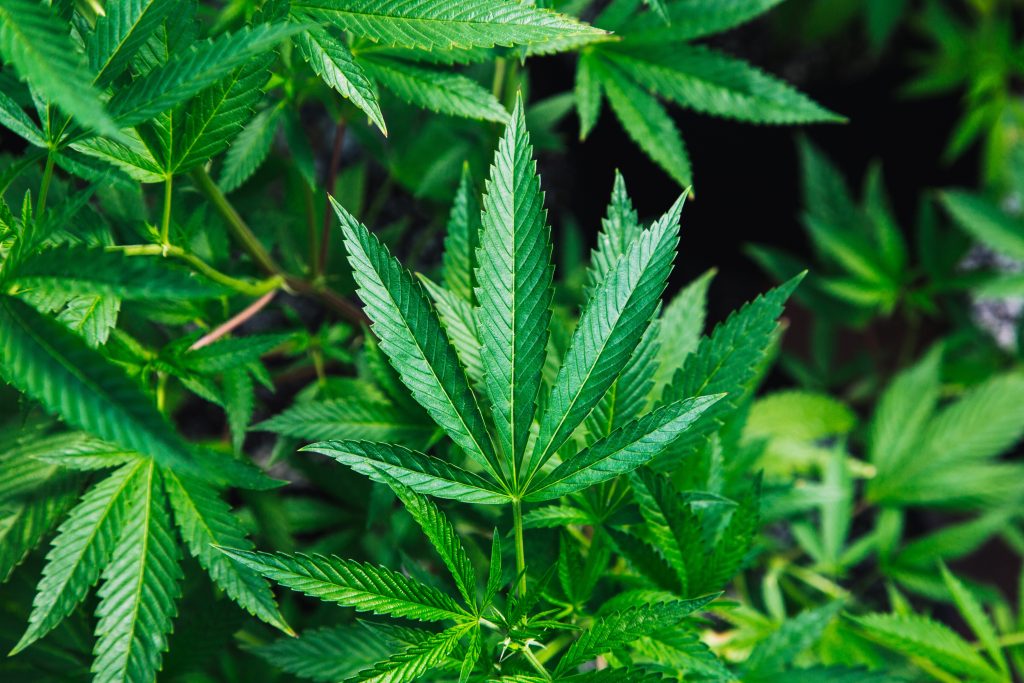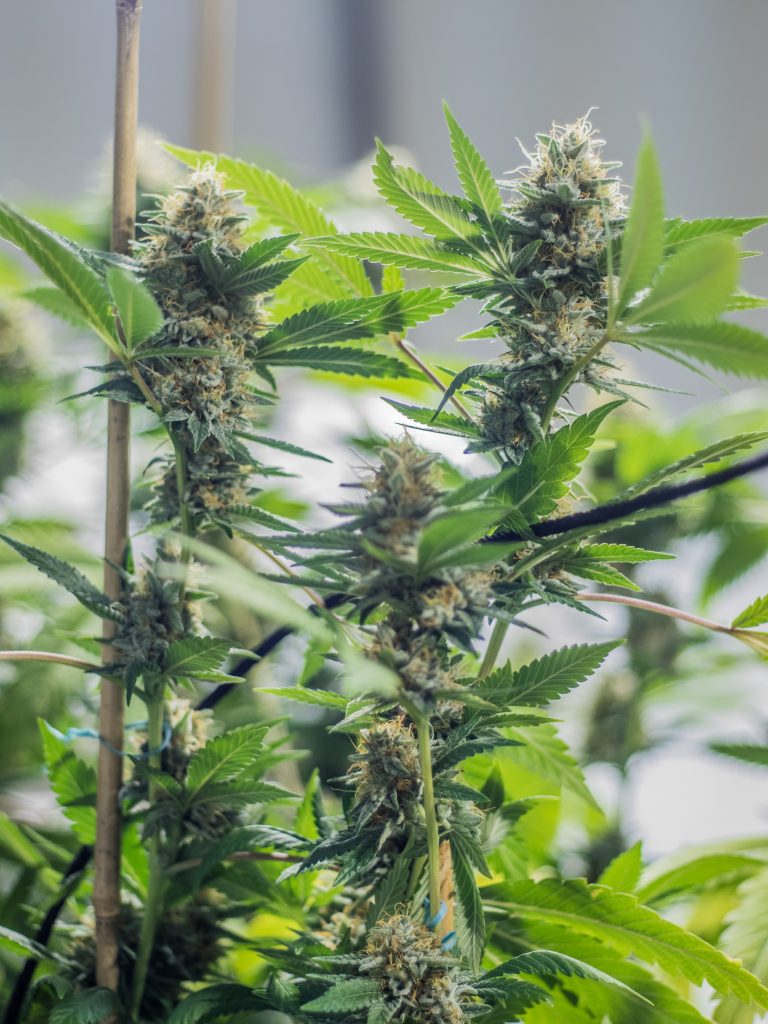A little disclosure to begin: Please remember that I am not a medical doctor and am not offering medical advice. Whether or not you choose to try a CBD product should be discussed with your personal doctor(s). My intent here is to present unbiased information so that you will be armed with facts.
You likely have a CBD store on a corner (or two) somewhere in your town and have heard about it’s potentially miraculous health benefits. Let’s dive in and see what the science currently tells us.
CBD Basics
CBD is an abbreviation for the phytochemical cannabidiol, a non-psychoactive component of hemp and marijuana, two varieties of the Cannabis sativa plant. Non-psychoactive means that it does not create a high and in fact does not have any effects on personality apart from potentially being calming or relaxing. The psychoactive effects of Cannabis come from THC (tetrahydrocannabinol), not CBD. THC is found only in marijuana, not hemp. In fact, CBD actually counteracts the psychedelic effects of THC.
Another difference between THC and CBD: With THC, you need to take more over time because you develop a resistance. With CBD, you’re able to take less over time, as the body becomes sensitized.
CBD, like all vitamins and supplements, is not subject to government oversight for safety or efficacy in the US.

CBD in the Body
CBD works by interacting with the endocannabinoid system. The endocannabinoid system has receptors in every system of the human body: Nervous, digestive, skeletal, dermal, reproductive, cardiovascular, respiratory, etc.
The primary function of the endocannabinoid system is to maintain balance for the body’s systems. If one system goes out of balance, the endocannabinoid system deploys cannabinoids to bring that system back into harmony. Of note is that this is part of our bodies as God designed them. It’s not as if the endocannabinoid system doesn’t exist unless you are taking CBD, smoking marijuna or ingesting THC in some other form. Our bodies naturally produce chemicals that are very similar to CBD.
The endocannabinoid system is one of the key endogenous systems in the body responsible for regulating pain sensation. It is also part of all physiological systems that modulate healing. This is also the same system in the body that might make you feel physical pain when you feel intense emotional pain. Chronic pain itself can have so many subsequent effects such as anxiety, irritability, low self-esteem, decreased productivity, depression, insomnia, increased suicide risk and more. The endocannabinoid system is also involved in modulation of inflammation and subsequently, there is a lot of research currently pointing to the endocannabinoid system playing a fundamental role with inflammatory diseases, many of which are related to lifestyle.
“Pain, inflammation, and oxidative stress are symptoms of every chronic, modern, inflammatory disease—from headaches to migraines to Crohn’s disease to ulcerative colitis to arthritis to cardiovascular disease, and to depression, which is now considered to be an inflammatory condition” – Chris Kresser
Because of the way CBD works and how integrated the endocannabinoid system is within the body, CBD has the potential (and has been shown in short-term studies) to be beneficial for:
- Inflammatory bowel diseases and GI issues
- Mood disorders and anxiety
- Pain
- Chronic inflammatory conditions, such as rheumatoid arthritis
- Autoimmune conditions
- Nausea
- Alzheimer’s disease and dementia
Let’s talk a little bit about CBD’s potential ability to protect the brain and, more specifically, to protect the brain from diseases like Alzheimer’s, Parkinson’s and dementia. The statistics on Alzheimer’s disease are staggering, and many experts have started referring to the disease as Type 3 Diabetes because it’s so closely related to lifestyle factors like diet, exercise, and sleep hygiene. Studies have demonstrated CBD’s ability to prevent free radical damage, reduce inflammation, and protect brain cells. Other studies have also demonstrated the role of the endocannabinoid system in simulating neurogenesis, which simply means growing new brain cells. One study showed that CBD modulates the expression of Alzheimer’s disease-related genes, meaning it might play a role in whether or not you actually develop the disease that you are predisposed to. For those who are already experiencing a neurological disease, there is some hope from ongoing studies, one of which demonstrated that CBD was able to improve the quality of life for Parkinson’s patients.
Is CBD legal?
One outcome of the Agriculture Improvement Act of 2018 was the Hemp Farming Act of 2018. This bill removed hemp (and cannabis containing less than 0.3% THC) from the list of Schedule I controlled substances. This bill effectively made CBD legal in all 50 states, as long as it contains less than the 0.3% of THC. This is significant because it affects medical research, or the lack thereof. Because of it’s previous Schedule I classification until just recently, there are few long-term studies on CBD and its effects. It was simply too difficult for medical centers to obtain CBD for use in clinical trials. That has all changed and there are currently many studies underway with many being published on a regular basis.
A few of the legal highlights regarding CBD:
- CBD is legal in all 50 states at the federal level
- The Farm Bill stipulates that states cannot block the intrastate transport of hemp and its derivatives, including cannabinoids such as CBD
- The TSA states that it’s 100% legal to travel with CBD oil
- In the U.S., cannabis plants with a THC content <0.3 percent are not considered psychoactive, and are therefore legally classified as “hemp”
- Certain countries in Europe have THC thresholds of 1 percent

Which form of CBD is best?
A lot of CBD products come in the fat-soluble form because it seems that fat enhances the bioavailability, meaning how well your body can use the CBD. This might be in the form of a tincture that you swallow directly or place under your tongue or may be in the form of a gel capsule. There are also gummies and other edibles available. If you asked me, I would stick to a tincture or capsule. I certainly would not recommend purchasing or consuming any sort of CBD product that is not sealed and labeled (brownies and other baked goods come to mind). You need to know what you are putting in your body.
CBD can also be used topically in the form of gels or lotions. I have also seen it in the form of an antimicrobial for certain skin conditions such as psoriasis. I have only used one CBD lotion product for arthritis pain on my feet and other than a cooling sensation from the eucalyptus and mint essential oils, I didn’t notice any great effect. I did not use it long-term though, I simply had a free sample to try.
Are there dosing recommendation for CBD?
Most of the human studies use dosages anywhere between 20 and 1,500 milligrams (mg) per day. Yes, that’s quite a large range!
The amount of CBD you should take depends on a range of factors, including:
- your body weight
- the condition you’re treating
- your individual body chemistry
- the concentration of CBD in each pill, capsule, drop, or gummy
In other words, there are a lot of variables that go into deciding how much CBD to take. Before trying CBD, be sure to talk to your doctor about an appropriate dosage and any potential risks. If your doctor tells you how much to use, stick to their recommendation.
If your doctor doesn’t provide a recommendation, or you simply choose to try something on your own, it’s best to start with a smaller dosage and gradually increase it. This could mean starting with 20 to 40 mg a day. After a week, increase this amount by 5 mg. Continue this until you feel that it’s effectively treating your symptoms.
Keep track of how much CBD you’re taking and whether your symptoms are getting better. Write it down on paper or in a notes app on your phone.
Using CBD in the form of a lotion or other topical is naturally much harder to keep track of dose than a form you would take internally.
Is is possible to take too much CBD?
A 2011 review on the safety and side effects of CBD found that continuous use of CBD, even in high doses like 1,500 mg a day, is tolerated well by humans.
A 2017 update to this review also confirmed those same results. However, a 2019 mouse study did raise some safety concerns about CBD’s potential for liver damage and its interactions with other medications.
If you’re currently taking medication and would like to try CBD, it’s essential to discuss this with your doctor.
There are very few known side effects of CBD. When side effects do occur, however, they may include diarrhea, appetite changes, and fatigue.
Final Thoughts
Some people take CBD as a preventative for chronic illnesses, such as autoimmune conditions, arthritis and dementia. Alternatively, CBD can be taken “as needed” for immune boosting or to treat acute inflammation. Personal story: Because good quality CBD is so expensive and not covered by my insurance, I do not take it as a preventative for my autoimmune condition, but I do take it as needed for headaches, other pain such as toothaches or extreme muscle soreness and during times of extreme stress. It has helped me tremendously during these times. I personally take the Cannabomega from Designs for Health because of it’s combination with omega-3s which are beneficial on their own, but also help the body better utilize the CBD. (I believe you have to set up an account through your health care provider to purchase this specific product).
This is the brand of CBD oil recommended by Chris Kresser and even though I haven’t tried it myself, I do trust his recommendations.
If you are going to embark upon trying CBD to see how it can help your health, pay attention to how it makes you feel. Just like all other things functional medicine related, there is a lot of personal experimentation involved. So far anyway, CBD appears to be extraordinarily safe and potentially very beneficial. All of the functional medicine and mainstream medical experts I researched, agree on CBD’s safety and potential efficacy.
We currently understand a lot of the mechanisms surrounding CBD, we have preliminary data showing benefits in a lot of different chronic disease states, however we do not yet have dose-response studies, meaning researchers do not currently know how much CBD should be taken, how often and in what form for maximum benefit for each disease state. There is much that is still unknown.
There are also possible drug interactions that you must be careful with, which is why you need to involve your doctor in this process.
All of the current research suggests that cannabinoid-based therapies could be extremely beneficial in the prevention and/or maintenance of some very debilitating conditions. Because of its antioxidant, anti-inflammatory and neuroprotective properties, CBD could be a healthy addition to your wellness routine, but I would caution you to purchase only from a trusted source and not one of the many hemp or CBD stores that are popping up all over the place!
